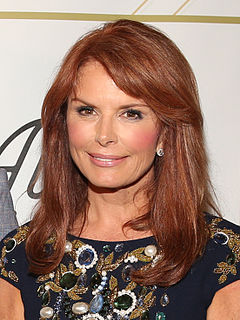A Quote by Roma Downey
There's an assumption in many of these cultures that these children are mentally retarded, when in fact they're not at all. I saw how the operation affects the child, as well as the child's family and often the village.
Related Quotes
Please don't kill the child. I want the child. Please give me the child. I am willing to accept any child who would be aborted, and to give that child to a married couple who will love the child, and be loved by the child. From our children's home in Calcutta alone, we have saved over 3,000 children from abortions. These children have brought such love and joy to their adopting parents, and have grown up so full of love and joy!
You often hear attacks on international adoption as robbing a child of his or her culture, and that's both true and false. It's true that an internationally adopted child loses the rich background of history and religion and culture and language that the child was born into, but the cruel fact is that most children don't have access to the local, beautiful culture within an orphanage.
Many toxic parents compare one sibling unfavorably with another to make the target child feel that he's not doing enough to gain parental affection. This motivates the child to do whatever the parents want in order to regain their favor. This divide-and-conquer technique is often unleashed against children who become a little too independent, threatening the balance of the family system.
The state is now more involved than it ever has been in the raising of children. And children are now more neglected, more abused and more mistreated than they have been in our time. This is not a coincidence. This is not a coincidence. And with all due respect, I am here to tell you it does not take a village to raise a child. It takes a family to raise a child.
Yesterday I saw a child wearing a T-shirt that said, "If you love me, don't feed me junk food." I was delighted to see this, but I also know how difficult it can be to feed our children well, particularly when the foods that are most convenient and the most heavily advertised are often the ones we should avoid. Joel Fuhrman's new book is a blessing, because it makes it so much easier. It is excellent, and full of clarity, wisdom, and guidance you can trust. It can indeed give you the power to shape your child's health destiny - John Robbins
One can tell a child everything, anything. I have often been struck by the fact that parents know their children so little. They should not conceal so much from them. How well even little children understand that their parents conceal things from them, because they consider them too young to understand! Children are capable of giving advice in the most important matters.
You want a child who never makes you anything but proud? Please. Don't bother taking on parenthood if you can't handle the fact that sometimes your child's identity won't be what you would have chosen. And if you want to prevent a child from ever suffering? Well, then don't have a child. No one is born into the world never to suffer.
The policy of letting the child 'do what he likes' is an insidious one, since the children are encouraged to continue always at their original superficial level, without receiving guidance in study. Furthermore, the 'three Rs,' the fundamental tools, are neglected as long as possible, with the result that the child's chance to develop his mind is greatly retarded. The policy of teaching words via pictures instead of by the alphabet tends to deprive the young child of the greatest reasoning tool of all.
This system in which a child is constantly moving objects with his hands and actively exercising his senses, also takes into account a child's special aptitude for mathematics. When they leave the material, the children very easily reach the point where they wish to write out the operation. They can thus carryout an abstract mental operation and acquire a kind of natural and spontaneous inclination for mental calculations.




































